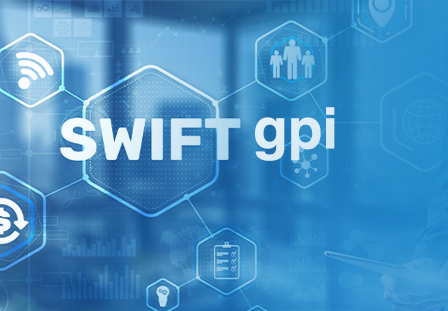- What we do
-
-
Digital Engagement Banking
CBX is built to enable banks to run lean, experiment, and operate with speed and agility while focusing technology resources on innovation.
Products
Combining products for fulfilling holistic needs of the customer.
Platforms
Combining products, solutions and capabilities from multiple providers.
Banking As A Service
Embed services within a customer’s ecosystem, and reshaping consumption patterns of end customers.
-
-
-
- Company
-
- Knowledge
-
- Contact Us
News Flash
National Bank of Kuwait (NBK) expands partnership with Intellect Global Transaction Banking
Read Full PR News FlashiGTB's CTX Platform Successfully Deployed by a leading European Bank in France
Read Full PR News FlashiGTB Pulse Newsletter February 2024
Read More News FlashHighlights of Transformation Strategies for Transaction Banking in Philippines & Thailand
Know More News FlashThe Perfect Storm - Opportunities and Threats on the Horizon
Read More
Corporate payment infrastructure modernization is not an option today—it’s a necessity

Corporate payment infrastructure modernization is not an option today—it’s a necessity
Mary Lee Muir is an experienced senior business development leader with over 20+ years of experience within the global payments, fintech and corporate and transaction banking industries. She has worked in senior client-facing business development roles within the BFSI sector for her entire career and is a passionate believer in the power of relationships AND technology to empower organisations for true success.
5 Mins
Real-time payments are not an option in most regions. Some banks have historically had a harder time meeting the demand for faster payments and lack of right resources that accompany faster settlement. The post Covid-19 world has bought intense volatility in the market and end users are not shying away from switching payments providers, be it to a competing bank or to a fintech firm directly, with real-time payments being one of the main drivers of change.
What was earlier a disadvantage for FIs, when end users had options to switch partner, either due to an competing FI or fintech vendor to meet their needs as technology became accessible. The good news is that technology is keeping up with demand. The advantage to this is that accessibility extends to FIs as well. In short, regional and geo focussed FIs today can compete with the larger global banks with the help of technology and right partner to remain relevant, competitive and drive customer stickiness.
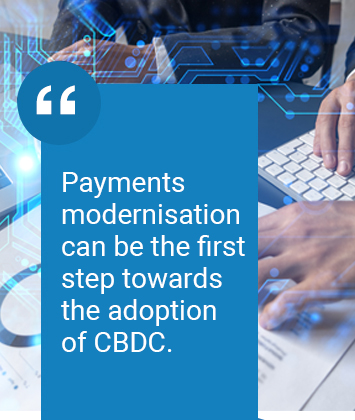
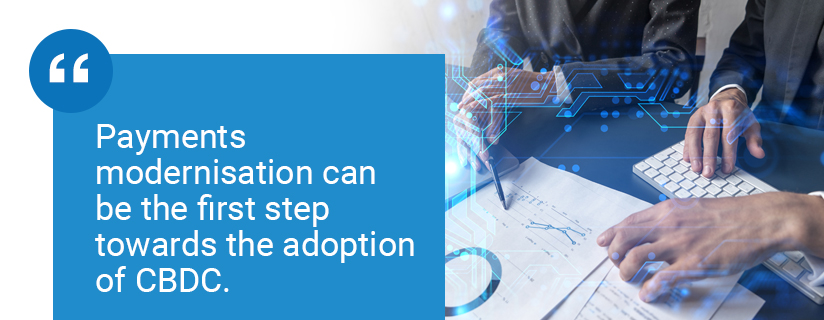
Also, there is an art of possibility – Payments modernization can be the first step towards the adoption of CBDC. The right product roadmap and the right partner enables you with a framework to facilitate the interconnection of central bank and commercial bank money, much in the same way that it works today. We at Intellect iGTB believe that blockchain has a role to play as it brings with it distributed ledger technology to preserve the relationship between central banks and commercial banks.
So, with the context above what I discussed, let us understand what are the drivers to Modernization.
A recent survey by Finextra quantified the latest trends in payments modernisation. The majority of bankers agreed why and when they need to execute the modernization of their payments infrastructure. I have highlighted a few of them and reason why it will compel bankers to invest in payments system modernisation:
• Reduce cost and complexity
Legacy IT systems can be a major challenge that financial institutions face when trying to simplify and reduce the cost of their payment infrastructure. Due to disparate applications, data movement between multiple sources is difficult; not only does this add complexity but also incurs high maintenance cost. Furthermore, manual processes are error-prone and laborious—taking away valuable time and resources of the bank
• Value-added service, meets customer demand
When Bankers decide that their corporate payments need to be taken to the next level with value-added services that provide customers extra benefits and features beyond just payment processing. Some key value adds such as automated invoicing and payment reminders, advanced analytics reporting, fraud prevention measures including multi-factor authentication systems, and cross-border payments are key areas in which banks can add considerable value. All of these help businesses reduce costs associated with late or missed payments as well as streamline their internal processes for a more efficient system overall.


• Risk Reduction
Financial institutions are being disrupted by the emergence of Fintech companies and challenger banks offering innovative, cost-effective digital solutions. The evolution in payments technology from distributed ledger technologies (DLT) is revolutionizing global money interaction with unprecedented opportunities – but also requiring a more adaptive approach for progressive banks to ensure successful integration across multiple payment engines within an enterprise hub so that user experience and operations can be optimized. To drive this progression even further, some organizations have taken matters into their own hands as they seek new blockchain-based payment networks to expedite transactions faster than ever before.
•Align to ever-changing regulatory landscape
Regulatory bodies across the globe are driving real-time payments initiatives, with SWIFT taking a key role in overhauling traditional cross-border correspondent banking paradigms. Through their global payment innovation (gpi) system, businesses receive frictionless and faster transactions that come with increased transparency as well as enhanced visibility. Additionally, API-driven open banking regulations such as PSD2’s X2A service allow for a new wave of instantaneous information flows
• Faster adoption to new payments rail
The adoption of faster payments requires an entire overhaul to the current payment infrastructure, this can be done in one go through the rip and replace or in a phased manner without impacting business as usual. Adopting to new payments rails will require making fundamental adjustments across initiation, approvals, tracking funds, reconciliation and ledgering. Even after adjusting processes to suit faster payments – there will still remain complex requirements such as controls and compliance that must be met before successful implementation. It truly is no small task!
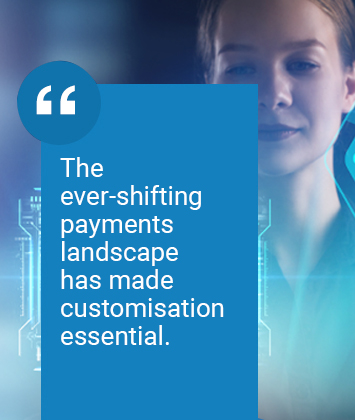

Banks have long relied on a basic and unchanging payment model, but this is no longer enough – the ever-shifting payments landscape has made customization essential. Open banking directives are increasing access to services while reducing competitive advantages, Rapid changes in technology mean now more than ever before banks must stay ahead of customer expectations if they’re going to remain relevant within the industry.
To stay ahead of the curve in digital payments, progressive banks must develop a platform offering highly contextual niche products tailored to their client’s needs. Additionally, they should leverage payment services from partner institutions for diversified cost optimization and revenue generation. Banks will become more than just product peddlers: by recommending intent-based solutions crafted around individual customer requirements – consumer or corporate alike – financial organizations can position themselves as trustworthy advisors with an eye on innovation.
At Intellect iGTB – Our Corporate Payment solution is designed to meet and exceed these requirements. Comprehensive support for all payment types (e.g., domestic/cross-border, batch/bulk/single/instant, low-/high-value value) and comprehensive support for ISO 20022 and MX messaging across the value chain, from payments initiation, pre-processing, and orchestration to execution and management.
Read more about how Intellect stands out among 15 global vendors and is rated as Leader and Best in Class Link
Hope you enjoy reading and appreciate the immense research work that goes into bringing such valuable reports for Bankers to make an informed choice on partner
Reference – https://www.finextra.com/researcharticle/247/payments-modernisation-the-big-survey-2022
Mary Lee Muir is an experienced senior business development leader with over 20+ years of experience within the global payments, fintech and corporate and transaction banking industries. She has worked in senior client-facing business development roles within the BFSI sector for her entire career and is a passionate believer in the power of relationships AND technology to empower organisations for true success.
Have a Question?
Ask Our Expert
Related Reads
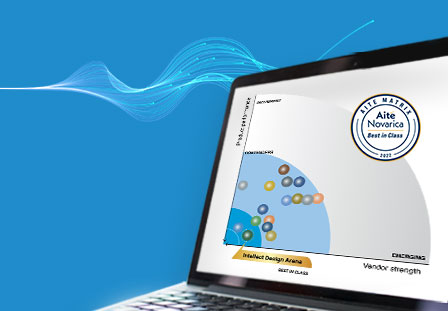
Intellect Global Transaction Banking (iGTB) identified as a leader and "Best in Class" Payments Platform provider

Payments fund control – Realtime limit management while doing Fund transfer for your corporate customers

Croatia says goodbye to Kuna as it enters the Eurozone – Implication to payments hub software
